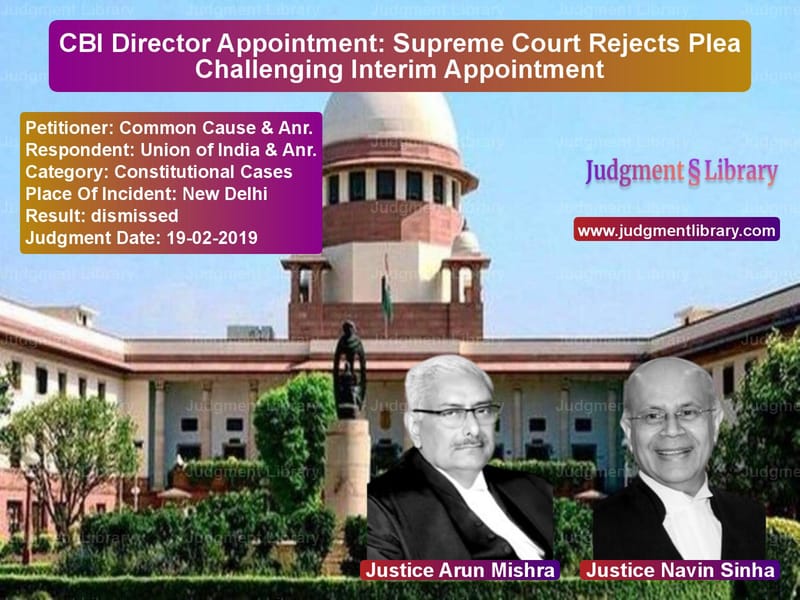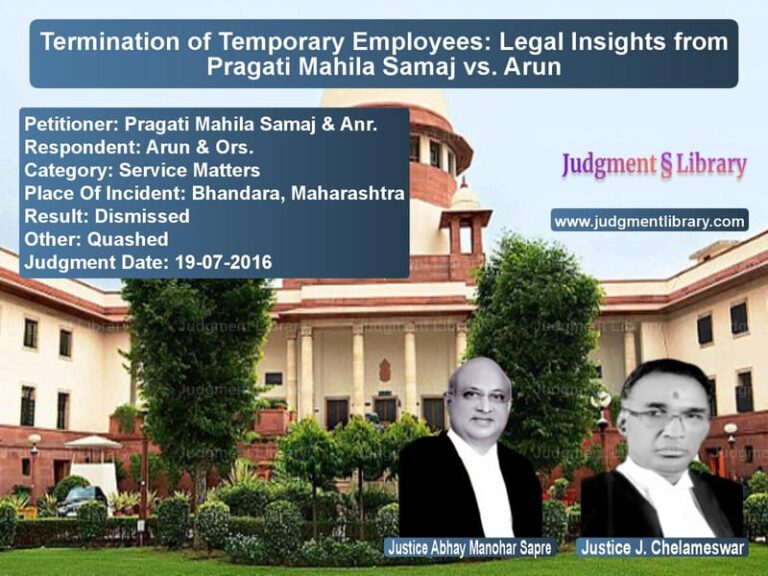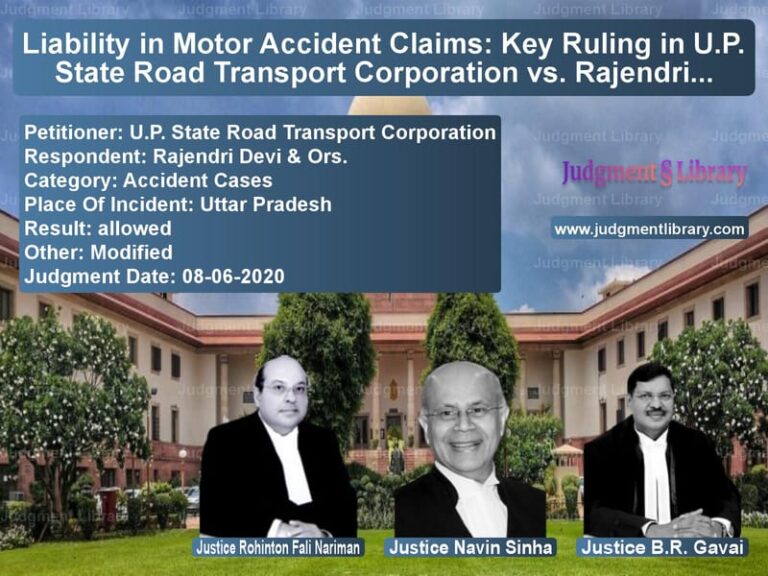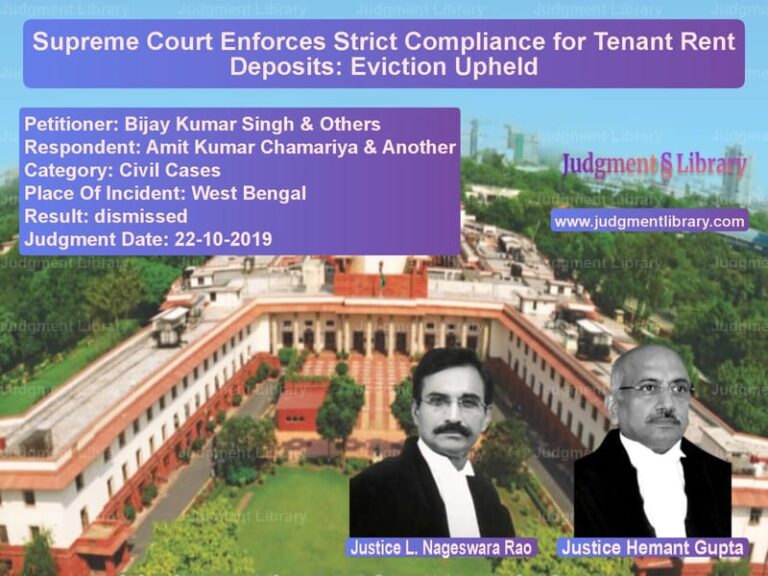CBI Director Appointment: Supreme Court Rejects Plea Challenging Interim Appointment
The Supreme Court of India recently ruled on the appointment of an interim Director of the Central Bureau of Investigation (CBI) in the case of Common Cause & Anr. vs. Union of India & Anr.. The petition challenged the appointment of M. Nageshwar Rao as the interim CBI Director, alleging procedural violations and lack of transparency in the selection process.
Background of the Case
The controversy arose after the removal of CBI Director Alok Verma on 10 January 2019. Following his removal, the government appointed M. Nageshwar Rao as the interim CBI Director, bypassing the statutory procedure prescribed under Section 4A of the Delhi Special Police Establishment (DSPE) Act, 1946. The petitioners, Common Cause and Anjali Bhardwaj, challenged this appointment, arguing that the government had violated the mandatory selection process.
The petitioners also raised concerns regarding the lack of transparency in the shortlisting and selection of the new CBI Director. They argued that the government had failed to disclose the selection criteria and deliberations, despite multiple Right to Information (RTI) requests seeking this information.
Key Issues Before the Supreme Court
- Whether the government violated Section 4A of the DSPE Act by unilaterally appointing M. Nageshwar Rao as interim CBI Director.
- Whether the appointment was legally valid despite not being recommended by the High Powered Selection Committee.
- Whether the government had a duty to disclose information regarding the selection process under the RTI Act.
Petitioners’ (Common Cause & Anr.) Arguments
- The petitioners contended that the government had acted arbitrarily by appointing M. Nageshwar Rao without following the mandatory selection process outlined in the DSPE Act.
- They argued that the High Powered Selection Committee, comprising the Prime Minister, the Chief Justice of India, and the Leader of the Opposition, was the only authority empowered to appoint a CBI Director.
- They cited previous Supreme Court judgments, including Vineet Narain & Ors. vs. Union of India (1998), which emphasized the need to insulate the CBI from executive interference.
- The petitioners also highlighted the lack of transparency in the selection process and the government’s refusal to disclose crucial details under the RTI Act.
Respondents’ (Union of India) Arguments
- The government defended its decision, arguing that the appointment of an interim CBI Director did not require the same procedure as a regular appointment.
- It claimed that the selection committee’s role was limited to appointing a permanent Director and was not necessary for interim arrangements.
- The government also pointed out that it had followed a similar process in previous cases and that the appointment was made to ensure the smooth functioning of the agency.
- Regarding transparency, the government maintained that all relevant information had been provided in accordance with the RTI Act.
Supreme Court’s Observations
The Supreme Court examined the legal provisions governing the appointment of a CBI Director and the principles of transparency and accountability. The Court made key observations:
“The appointment of the CBI Director must be made by following the due process prescribed under the DSPE Act. However, in cases of exigency, interim arrangements may be made to ensure continuity in administration.”
“The High Powered Selection Committee had, in its resolution, authorized the government to appoint an interim Director. Therefore, the claim that the appointment was illegal is misplaced.”
Key Findings of the Supreme Court
- The Court ruled that the government had acted within its authority in appointing an interim CBI Director.
- It held that the High Powered Selection Committee had authorized the government to make interim arrangements, making the appointment valid.
- The Court dismissed the claim that the selection process lacked transparency, noting that necessary information had been provided through official channels.
- The petition was dismissed as the main grievance—appointment of a regular CBI Director—had already been addressed.
Impact of the Judgment
The ruling has significant implications for future CBI appointments and administrative governance:
- It clarifies that interim CBI Director appointments do not necessarily require the same procedure as regular appointments.
- It upholds the government’s discretion in making temporary appointments in cases of exigency.
- It reinforces the role of the High Powered Selection Committee in ensuring transparency in permanent appointments.
- It limits the scope of judicial intervention in administrative decisions unless clear violations of statutory provisions are demonstrated.
Conclusion
The Supreme Court’s decision in Common Cause & Anr. vs. Union of India & Anr. reaffirms the government’s authority to appoint interim functionaries in administrative institutions. By rejecting the plea to quash M. Nageshwar Rao’s appointment, the Court clarified that interim arrangements are necessary for continuity in governance. This judgment sets a precedent for future cases involving appointments to key investigative agencies and underscores the importance of procedural compliance and institutional transparency.
Petitioner Name: Common Cause & Anr..Respondent Name: Union of India & Anr..Judgment By: Justice Arun Mishra, Justice Navin Sinha.Place Of Incident: New Delhi.Judgment Date: 19-02-2019.
Don’t miss out on the full details! Download the complete judgment in PDF format below and gain valuable insights instantly!
Download Judgment: Common Cause & Anr. vs Union of India & Anr Supreme Court of India Judgment Dated 19-02-2019.pdf
Direct Downlaod Judgment: Direct downlaod this Judgment
See all petitions in Fundamental Rights
See all petitions in Public Interest Litigation
See all petitions in Separation of Powers
See all petitions in Judgment by Arun Mishra
See all petitions in Judgment by Navin Sinha
See all petitions in dismissed
See all petitions in supreme court of India judgments February 2019
See all petitions in 2019 judgments
See all posts in Constitutional Cases Category
See all allowed petitions in Constitutional Cases Category
See all Dismissed petitions in Constitutional Cases Category
See all partially allowed petitions in Constitutional Cases Category







